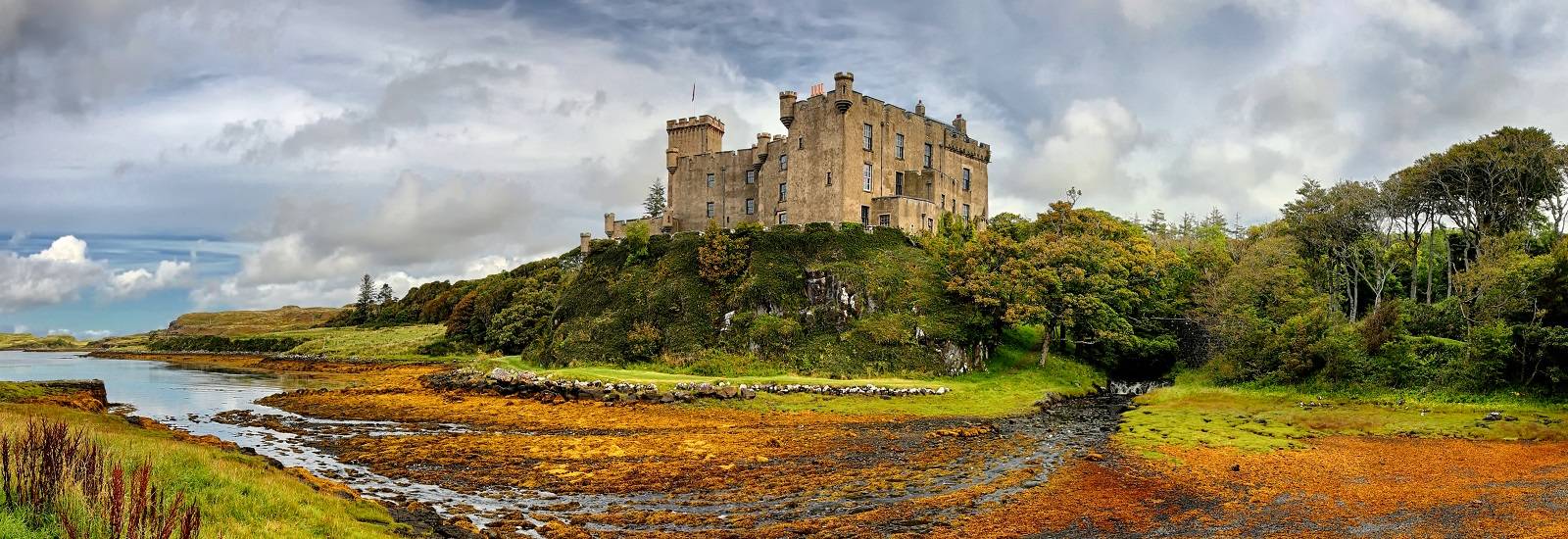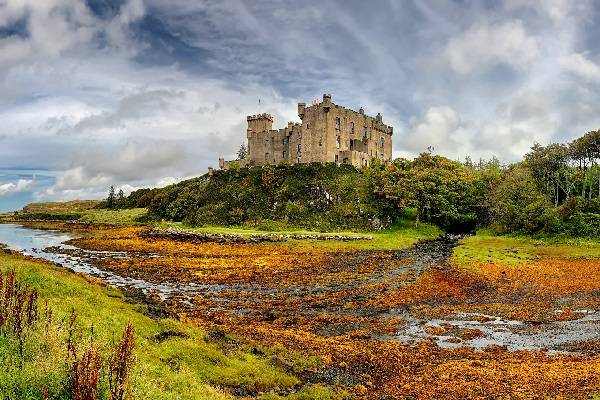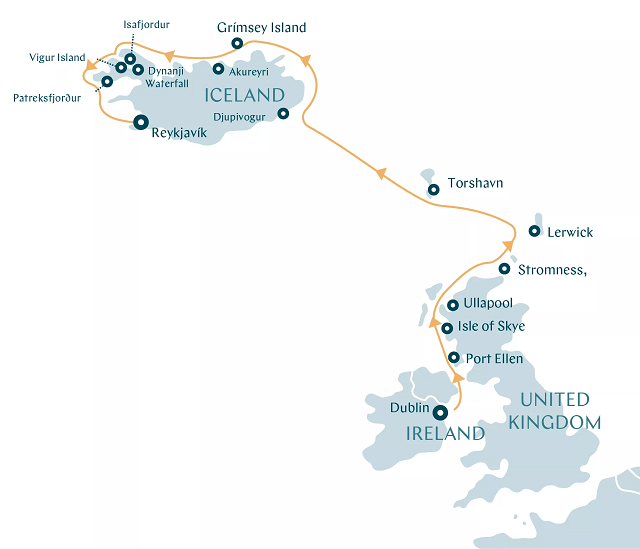HIGHLIGHTS
- Take a guided walk over the fascinating basalt columns that make up the Giant’s Causeway in Northern Ireland
- Explore Skara Brae, northern Europe’s best-preserved Neolithic village predating Stonehenge
- Visit the cosiest capital on Earth, the Faroe Islands’ Tórshavn, with turf-covered churches and rainbow-coloured homes
- Tour Lake Mývatn, the most geologically active area in Iceland, with boiling mud pools and a roaring waterfall
- Keep watch for spouting and breaching orca and humpback whales
DATES / RATES
Rates are listed per person
|
| Start Date | End Date | From EUR | From USD |
|---|
Rates are listed per person
|
| Start Date | End Date | From EUR | From USD |
|---|
ITINERARY
DAY 1
DUBLIN
Your cruise begins today in Dublin, the Republic of Ireland’s
capital. It’s at times gritty and in places, gorgeous
– Georgian squares, hidden parks and tree-lined canals.
It’s lively, complex, cosmopolitan and eminently walkable. So
make time to explore before you board Vega II. Visit The Long Room in
the Old Library in stately Trinity College to inspect the Book of
Kells. The illuminated manuscript was produced on Iona, which
you’ll visit on Day 4. The Long Room itself is much lauded
for its beauty – it’s a stunning, two-storey,
barrel-vaulted space that houses 200,000 of Trinity’s oldest
books and manuscripts. Elsewhere the new Museum of Literature Ireland,
the National Museum of Ireland, Christ Church and St
Patrick’s Cathedrals, the Guinness Storehouse, Kilmainham
Gaol, Glasnevin Cemetery entice visitors – just be sure to
stop into a snug somewhere for a pint.
DAY 2
PORT ELLEN, ISLAY ISLAND,
SCOTLAND
Port Ellen is a small village on the Isle of Islay in Scotland, known
for its whisky distilleries and stunning scenery. One of the main
attractions is the nearby Carraig Fhada Lighthouse, which offers
stunning views of the coastline and the surrounding islands. There is
also the Singing Sands beach, a beautiful white sand beach with crystal
clear waters that is perfect for a relaxing day out. For those
interested in history, the Museum of Islay Life showcases the island's
rich cultural heritage. It exhibits everything from traditional crafts
and farming practices to the history of whisky production in Islay.
DAY 3
DUNVEGAN, SKYE ISLAND,
SCOTLAND
Located on the west coast of the Isle of Skye, Dunvegan and Dunvegan
Castle have historically been the seat of the Clan MacLeod. The castle
sprawls out on top of a beautiful rocky outcrop and is home to some
fascinating artefacts. These include the Fairy Flag (a silk banner
sacred to the clan that dates back to the 4th century), Bonnie Prince
Charlie’s waistcoat and a lock of his hair. The oldest parts
of the castle date back to the 14th century, with most of it
constructed in the 15th and 16th centuries.
Shore Excursion (See Optional Activities)
DAY 4
ULLAPOOL, SCOTLAND
As dramatic as they come, this village on Scotland’s west
coast sits on fjord-like Loch Broom, the narrow waters curling away
into the distance below the misty mountains. The countryside is packed
with wonders: Carrieshalloch Gorge, steep, narrow and with the roar of
rushing water; Achmelvich Beach, a perfect crescent of pure white sand
with turquoise waters protected by rocky outcrops; and the Bone Caves,
excavations where bones of reindeer and polar bear that once roamed
here have been found.
Shore Excursion (See Optional Activities)
DAY 5
STROMNESS, SCOTLAND
Romantically ramshackle, the appealing grey-stone town of Stromness may
not be as big as the Orkney’s capital Kirkwall, but what it
lacks in size, it more than makes up for in character. The
long-established seaport, with its Norse language-derived name, has
changed little since the 18th century. Captain Cook’s ships
stopped here in 1780 en route back from Hawaii, and Cook’s
companions would have explored a place not dissimilar to
today’s Stromness. Walk the narrow, flagstone-paved main
street, dive down the tiny alleyways which entice you to explore
further. The Stromness Museum is excellent and full of maritime
tchotchke. The Pier Arts Centre and its towering collection of modern
art have been described as a ‘little seaside Tate’.
Just 12 kilometres north of the harbour lies extraordinary Skara Brae,
one of the world’s most evocative prehistoric sites.
Predating Stonehenge and the pyramids of Giza, it is northern
Europe’s best-preserved Neolithic village.
Shore Excursion (See Optional Activities)
DAY 6
LERWICK, SCOTLAND
Lerwick is the capital – and only real town – of
the Shetland Islands, a subarctic archipelago of some 100 islands that
is closer to Bergen than Inverness. The Shetlands were Viking ruled
until the 15th century, and despite the Norseman ceding control, the
culture remained notably Norse-tinged as can be seen at the Shetland
Museum and Archives in Lerwick. More history awaits at Fort Charlotte,
a five-sided artillery, and the Bod of Gremista, an 18th-century
fishing booth-turned textile museum. If time allows, head for Jarlshof,
an hour’s drive from Lerwick. This Iron Age broch and Norse
settlement have more than 4,000 years of human activity on one site. If
venturing outside of Lerwick to Jarlshof for example, be sure to keep
an eye out for world-famous tiny Shetland ponies. Around 1,500 of them
roam free throughout the archipelago.
DAY 7
THORSHAVN
Disembark in Tórshavn, the port capital of the Faroe
Islands. Cut adrift in the Atlantic, halfway between Scotland and
Iceland, the Faroes are a self-governing archipelago within the Kingdom
of Denmark. Off the radar for most travellers, the Faroes are becoming
increasingly well known for their scenic splendour (think New Zealand
crossed with Iceland), and the unique cultural heritage. Thanks to a
melange of influences, the Faroes has its own flag, saga, dances,
traditions and language. Sited on the southern tip of Streymoy, the
largest of the 18 islands, the lively little capital,
‘Thor’s Harbour’ will charm with its
rainbow-hued clapboard warehouses, grass-roofed wooden churches and the
quaint old quarter, Tinganes. You might opt to explore the twin-sited
Føroya Fornminnissavn, an excellent museum; the Skansin
Fort; the church of Havnar Kirkja, with its distinctive clock tower. Or
the shops might tempt you, the fabulous concept store,
Öström, or renowned knitwear designer Gudrun
& Gudrun is an obvious choice in a place where sheep outnumber
people nearly two to one.
DAY 8
DJUPIVOGUR
Home to fewer than 500 residents, the quiet fishing village of
Djupivogur dates back to the Viking era. Despite its formidable
origins, the village is better known these days for its unhurried pace
of life. Djupivogur’s most famous artistic offering may be
the first thing you notice as you disembark. The 34 large granite eggs
that line the road along the bay are not easy to miss. The art
installation, named ‘The Eggs at Merry Bay’ (Eggin
í Gleðivík in Icelandic) represents the
34 species of birds that nest locally. Immerse yourself further into
the wild on a trip to nearby Vatnajökull National Park.
Covering 14% of Iceland’s land mass, this vast area is home
to giant ice caps, thundering glacial rivers, grumbling active
volcanoes and a host of other geological wonders. Take a guided tour
out onto Vatnajökull Glacier, Europe’s largest ice
cap, and experience the glory of true Icelandic wilderness for yourself.
DAY 9
GRIMSEY ISLAND
Grímsey is a remote island located 40km off
Iceland’s north coast. Many people travel here for the
purpose of setting foot in the Arctic Circle, the only place in Iceland
where you can do so. The island is also home to fewer than 100 people,
but over one million seabirds. Birdlife thrives here thanks to the lack
of egg predation (there are no rats or mice on the island) and the
rich, well-stocked surrounding seas. Grímsey has one of
Iceland’s largest tern nesting sites and largest puffin
colonies.
DAY 10
AKUREYRI
Home to some 18,000 residents, Akureyri stands proud as the Land of
Fire and Ice’s ‘Capital of the North’.
It’s the gateway to some natural wonders including the Myvatn
region, Dettifoss waterfall, Godafoss waterfall and Asbyrgi canyon. But
before you rush off, take some time to explore: Iceland’s
winsome second city is colourful, cosy and utterly enchanting
– even the red traffic lights are cute. Instagrammers will
adore heart-shaped stop signs. Enjoy the quaint harbourfront; climb the
steps to the towering Akureyri Church; stroll around Lystigardurinn,
the city’s Arctic botanical garden; visit the
Laufás Turf Houses; get in the festive spirit early at the
Christmas House (Jolahusid); admire the exhibits at the Akureyri Art
Museum or the Hof cultural centre; or take a dip in the outdoor,
geothermal swimming pool.
DAY 11
ISAFJORDUR
Surrounded by fjords in the Westfjords region,
Ísafjördur is a bustling fishing town in northwest
Iceland with colourful wooden 18th- and 19th-century houses in the old
town of Neskaupstadur. Ísafjördur was one of the
largest fisheries in Iceland, but tourism has now taken over. Nearby is
Sudavik, home to the Arctic Fox Centre. Iceland’s only
mammal, the arctic fox lives on the lush tundra of Hornstrandir Nature
Reserve - the northernmost peninsula in the Westfjords with two of
Europe’s largest bird cliffs.
DAY 11
VIGUR ISLAND
Island of Vigur is a real pearl of the Western Fjords. The
second-largest island in the fjord, measuring two kilometres by 400
metres, it’s a significant seabird colony, which is home to
arctic terns, puffins, black guillemots and eider ducks. As one of only
two inhabited islands in the fjord, Vigur is also the site of a single
farm, which has been in the same family for generations. During your
time on the island, you might see Iceland’s only windmill,
the country’s smallest post office and oldest boat, which was
built more than 200 years ago and in regular use until relatively
recently.
Shore Excursion (See Optional Activities)
DAY 12
DYNJANDI WATERFALL
Considered one of Iceland’s most impressive, this thunderous
waterfall in the Westfjords region gives the impression of a bridal
veil as it spreads its tumbling waters down a series of ever- growing
cascades. Dynjandi is one of the most photographed sights in Iceland.
Walking up to it takes 15 minutes passing five smaller waterfalls.
Nearby, Hrafnseyri is the birthplace of Jón Sigurdsson,
19th-century leader of the Icelandic Independence movement. The museum
includes an Icelandic turf house.
Expedition Activities (See Optional Activities)
DAY 12
PATREKSFJÖRÐUR
The largest town in the southern part of Iceland’s striking
Westfjords region, Patreksfjörður was a pioneering
force in Iceland’s fishing industry. Today commercial fishing
remains the town’s primary industry. One of
Patreksfjörður’s main draws is the nearby
Látrabjarg Cliff. This stunning slice of coastline is
Europe’s largest bird cliff, as well as being the
continent’s most western point. One of the world’s
best seabird watching spots, this place is a must-see for keen
ornithologists. Látrabjarg Cliff is also the perfect place
to capture that iconic puffin photo. The puffins here are protected and
have little reason to fear humans, allowing for some excellent photo
opportunities.
DAY 13
REYKJAVIK
Your cruise ends in Reykjavík. Make sure there is sufficient
time before you begin your journey home to explore this diminutive but
dramatic capital city. Despite its small size, you won’t be
short of things to see and do. To get your bearings, take the elevator
to the top of Hallgrímskirkja. This church, designed by
famed Icelandic architect Gudjón Samuelsson is one of the
most distinctive buildings in town. When you return to earth, visit the
city’s other renowned building Harpa Concert Hall, located at
the heart of Reykjavík's regenerated harbour –
also the home of the Maritime Museum. Speaking of cultural spaces, tour
the National Museum to learn the story of Iceland from past to present.
The Reykjavík Art Museum houses an impressive contemporary
collection including eye-catching pieces by Erró. And, of
course, just 50 kilometres outside the city lies Thingvellir National
Park, the site of Iceland’s original Viking parliament.
 (Click image to view Ship details)
(Click image to view Ship details)
WHAT'S INCLUDED
- Group return transfers from the airport to the cruise port (via our included accommodation where applicable)
- One night pre-cruise accommodation with breakfast in a 4/5-star hotel or onboard
- All meals onboard
- Onboard accommodation in a stateroom selected category
- 24-hour room service
- Coffee, tea, soft drinks and selected alcoholic beverages available 24-hours per day
- Lecture programmes by our experienced expedition team and guest speakers
- One selected shore excursion/expedition activities per port of call (Kayak not included, bookable for a fee on board)
- Branded Swan Hellenic expedition parka and use of rubber boots in Polar Regions
- Standard WiFi
- Onboard gratuities & port taxes
DAY 3
DUNVEGAN, SKYE ISLAND, SCOTLAND
Shore Excursion
Dunvegan castle
Duration: 02 h 00 m
Included
Visit Dunvegan Castle, the oldest continuously inhabited castle in Scotland; it has been the ancestral home of the Chiefs of clan MacLeod for 800 years
Discover the treasures of a Castle steeped in history and clan legend and explore the lovely gardens and Rory Mor's cascade
Northern scenic drive
Duration: 04 h 30 m
Optional
Learn all about the Isle of Skye, from its geography and social history to its myths and legends
Visit the fascinating Skye Museum of Island Life to learn more of the traditional crofting life
Stop at Kilt Rock – a dramatic 200-foot high cliff marked in an almost tartan-like pattern by the rock strata and with a waterfall tumbling sheer to the pebbled shore below
DAY 4
ULLAPOOL, SCOTLAND
Shore Excursion
Scenic Assynt
Duration: 03 h 30 m
Included
Enjoy a panoramic drive through the dramatic scenery Scotland Geopark.
Spend some time to have a picture of Ardvreck Castle, a marvellously scenic ruined fortress in a magnificent location
Spend some free time in the pretty fishing village of Lochinver
Hiking to Knockan Crag - Heart of the Geopark
Duration: 03 h 00 m
Optional
Knockan Crag, one of Scotland’s natural beauties, is a must visit for all the hiking lovers, but also for those searching for an excursion to explore something new.
Explore the Geopark by following one of three trails whilst learning about this fascinating natural feature, spend some time in the excellent visitor centre and walk along the Thrust Trail bridging 500 million years.
Singelton of Glen Ord with free time in Beauly
Duration: 04 h 45 m
Optional
Enjoy a panoramic drive along picturesque shores of Loch Broom towards Muir of Ord .
Visist Glen Ord Distillery one of one of the Highland’s hidden treasures producing liquid gold all year round.
Discover all the secrets of the whisky production and taste the Singleton of Glen Ord range
DAY 5
STROMNESS, SCOTLAND
Shore Excursion
Orkney Treasures
Duration: 03 h 15 m
Included
Walk among the enigmatic stones of one of the most spectacular prehistoric monuments in the British Isles. The Ring of Brodgar Stone Circle and Henge, an enormous ceremonial site dating back to the 3rd millennium BC.
Step back 5,000 years in time to explore the best-preserved Neolithic settlement in Western Europe, Skara Brae
Discover the fascinating history of Skaill House built by Bishop George Graham in the 1620’s.
DAY 11
VIGUR ISLAND
Shore Excursion
Vigur Island Walking Tour
Duration: 01 h 30 m
Included
Spot eider ducks nesting in great numbers, you might even see the majestic birds plucking down from their chests to make a warm shelter for their eggs.
Get up close with a 200-year-old, eight-oar rowing boat and the oldest windmill in Iceland
See the charming houses that dot Vigur's landscape including Viktoria House,built in 1862 and restored by the National Museum of Iceland in 1993, as well as a house established by a young priest in 1884
DAY 12
DYNJANDI WATERFALL
Expedition Activities
Walk to Dynjandi Waterfall With Swan Hellenic Expedition Team
Duration: 01 h 30 m
Included
Your onboard expedition team, experts in all things Icelandic, will guide you along the path to this hidden treasure.
Awaken your spirit of adventure as you witness nature's raw power firsthand
Discover the secrets of Dynjandi and providing a deeper understanding of its geological significance and cultural importance.







